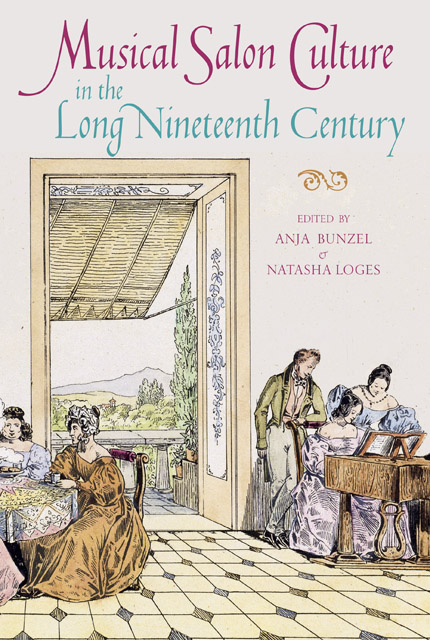9 - Offenbach and the Representation of the Salon
Published online by Cambridge University Press: 17 January 2023
Summary
The salon found multiple representations, not only through image and instrument, but also through musical works. This chapter considers the representation of salon culture on stage, touching on a witty and amusing operetta by Jacques Offenbach (1819–80), entitled Monsieur Choufleuri restera chez lui le …. (Mr Cauliflower Is At Home on …). Choufleuri is the name of the main character, derived from choufleur (cauliflower). A bourgeois gentleman and wealthy pensioner who wants to be perceived as a patron of the arts, Choufleuri arranges a musical soirée in his home, even though he himself thoroughly dislikes music, as he confesses to his daughter Ernestine. The literal translation of the expression restera chez lui is ‘he will be at home’. As in English, this wording functions as an invitation: Choufleuri will attend his guests at the soirée musicale. The ellipsis indicates the date of the event, which from the libretto is 24 January 1833 – the year in which Offenbach settled in Paris, leaving his native Germany, and briefly studied at the Conservatoire.
Matthias Brzoska has studied Offenbach’s career and the genre most closely associated with his name, the operetta, in the light of the theatrical landscape and system of musico-theatrical genres of contemporary Paris. As he pointed out, the founding of Offenbach’s Théâtre des Bouffes-Parisiens became possible due to a gap in the system of operatic genres of contemporary Paris. During the 1850s, both the Opéra-Comique and the Théâtre-Lyrique began to cultivate a more serious type of opera, thus creating an opening for a new type of theatre showing lighter, genuinely comic operas. According to Bzroska, it was because of the official restrictions arising from the system of privileges that Offenbach’s theatre programmed short pieces with only a few people in its early period. While I concur with Brzoska, his argument can be refined by including in the investigation a thus-far unexplored genre and music scene of contemporary Paris: the salon opera. Therefore, I will shed light on the music played in Monsieur Choufleuri and I will contexualise it compositionally and cultural-historically. Following a brief historical outline of the opera genre in Paris, I will first examine Offenbach’s influence on French opera, and on the Paris musical scene more generally.
- Type
- Chapter
- Information
- Musical Salon Culture in the Long Nineteenth Century , pp. 139 - 152Publisher: Boydell & BrewerPrint publication year: 2019



